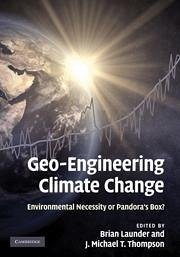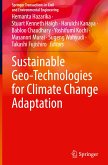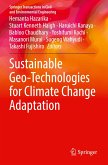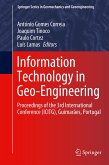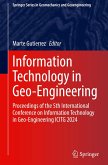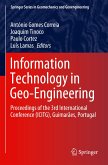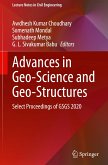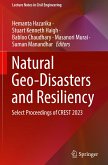J Michael T ThompsonEnvironmental Necessity or Pandora's Box?
Geo-Engineering Climate Change
Environmental Necessity or Pandora's Box?
Herausgeber: Launder, Brian
Schade – dieser Artikel ist leider ausverkauft. Sobald wir wissen, ob und wann der Artikel wieder verfügbar ist, informieren wir Sie an dieser Stelle.
J Michael T ThompsonEnvironmental Necessity or Pandora's Box?
Geo-Engineering Climate Change
Environmental Necessity or Pandora's Box?
Herausgeber: Launder, Brian
- Gebundenes Buch
- Merkliste
- Auf die Merkliste
- Bewerten Bewerten
- Teilen
- Produkt teilen
- Produkterinnerung
- Produkterinnerung
The first critical appraisal of the geo-scale engineering interventions proposed to counter the devastation of run-away global warming.
Andere Kunden interessierten sich auch für
![Sustainable Geo-Technologies for Climate Change Adaptation Sustainable Geo-Technologies for Climate Change Adaptation]() Sustainable Geo-Technologies for Climate Change Adaptation75,99 €
Sustainable Geo-Technologies for Climate Change Adaptation75,99 €![Sustainable Geo-Technologies for Climate Change Adaptation Sustainable Geo-Technologies for Climate Change Adaptation]() Sustainable Geo-Technologies for Climate Change Adaptation75,99 €
Sustainable Geo-Technologies for Climate Change Adaptation75,99 €![Information Technology in Geo-Engineering Information Technology in Geo-Engineering]() Information Technology in Geo-Engineering154,99 €
Information Technology in Geo-Engineering154,99 €![Information Technology in Geo-Engineering Information Technology in Geo-Engineering]() Information Technology in Geo-Engineering149,99 €
Information Technology in Geo-Engineering149,99 €![Information Technology in Geo-Engineering Information Technology in Geo-Engineering]() Information Technology in Geo-Engineering149,99 €
Information Technology in Geo-Engineering149,99 €![Advances in Geo-Science and Geo-Structures Advances in Geo-Science and Geo-Structures]() Advances in Geo-Science and Geo-Structures171,99 €
Advances in Geo-Science and Geo-Structures171,99 €![Natural Geo-Disasters and Resiliency Natural Geo-Disasters and Resiliency]() Natural Geo-Disasters and Resiliency165,99 €
Natural Geo-Disasters and Resiliency165,99 €-
-
-
The first critical appraisal of the geo-scale engineering interventions proposed to counter the devastation of run-away global warming.
Produktdetails
- Produktdetails
- Verlag: Cambridge University Press
- Seitenzahl: 332
- Erscheinungstermin: 18. Januar 2010
- Englisch
- Abmessung: 251mm x 177mm x 22mm
- Gewicht: 834g
- ISBN-13: 9780521198035
- ISBN-10: 0521198038
- Artikelnr.: 28245086
- Herstellerkennzeichnung
- Libri GmbH
- Europaallee 1
- 36244 Bad Hersfeld
- gpsr@libri.de
- Verlag: Cambridge University Press
- Seitenzahl: 332
- Erscheinungstermin: 18. Januar 2010
- Englisch
- Abmessung: 251mm x 177mm x 22mm
- Gewicht: 834g
- ISBN-13: 9780521198035
- ISBN-10: 0521198038
- Artikelnr.: 28245086
- Herstellerkennzeichnung
- Libri GmbH
- Europaallee 1
- 36244 Bad Hersfeld
- gpsr@libri.de
Michael Thompson graduated from the University of Cambridge with first class honours in mechanical sciences in 1958. Further degrees include ScD (Cambridge) and honorary DSc (University of Aberdeen). He spent a year as a Fulbright researcher in aeronautics and astronautics at Stanford before joining University College London (UCL) in 1964. He was appointed a professor in 1977, and subsequently Director of the Centre for Nonlinear Dynamics. Professor Thompson was elected a Fellow of the Royal Society in 1985 and has served on the Council of the Society. He has been honoured with the OMAE Award (American Society of Mechanical Engineers, 1985), the Alfred Ewing Medal (Institution of Civil Engineers, 1992), and a Gold Medal for lifetime contributions to mathematics (IMA, 2004). He is currently Emeritus Professor at UCL, Honorary Fellow at DAMTP in Cambridge, and sixth century Professor (part-time) in Theoretical and Applied Dynamics at Aberdeen.
Preface Brian Launder and J. Michael T. Thompson; Part I. Scene Setting: 1. Geo-engineering: could we or should we make it work? Stephen H. Schneider; 2. Reframing the climate change challenge in light of post-2000 emission trends Kevin Anderson and Alice Bows; 3. Predicting climate tipping points J. Michael T. Thompson and Jan Sieber; 4. A geo-physiologist's thoughts on geo-engineering James Lovelock; 5. Coping with carbon: a near term strategy to limit carbon dioxide emissions from power stations Paul Breeze; Part II. Carbon Dioxide Reduction: 6. Capturing CO2 from the atmosphere David W. Keith
Kenton Heidel and Robert Cherry; 7. Carbon neutral hydrocarbons Frank S. Zeman and David W. Keith; 8. Ocean fertilisation: a potential means of geo-engineering? R. S. Lampitt
E. P. Achterberg
T. R. Anderson
J. A. Hughes
M. D. Iglesias-Rodriguez
B. A. Kelly-Gerreyn
M. Lucas
E. E. Popova
R. Sanders
J. G. Shepherd
D. Smythe-Wright and A. Yool; 9. The next generation of iron fertilisation experiments in the Southern Ocean V. Smetacek
and S. W. A. Naqvi; Part III. Solar Radiation Management: 10. Global temperature stabilization via controlled albedo enhancement of low-level maritime clouds John Latham
Philip J. Rasch
Chih-Chieh (Jack) Chen
Laura Kettles
Alan Gadian
Andrew Gettleman
Hugh Morrison
Keith Bower and Tom Choularton; 11. Sea-going hardware for the cloud albedo method of reversing global warming Stephen Salter
Graham Sortino and John Latham; 12. An overview of geo-engineering of climate using stratospheric sulfate aerosols Philip J. Rasch
Simone Tilmes
Richard P. Turco
Alan Robock
Luke Oman
Chih-Chieh (Jack) Chen
Georgiy L. Stenchikov and Rolando R. Garcia; 13. Global and Arctic climate engineering: numerical model studies Ken Caldeira and Lowell Wood; Index.
Kenton Heidel and Robert Cherry; 7. Carbon neutral hydrocarbons Frank S. Zeman and David W. Keith; 8. Ocean fertilisation: a potential means of geo-engineering? R. S. Lampitt
E. P. Achterberg
T. R. Anderson
J. A. Hughes
M. D. Iglesias-Rodriguez
B. A. Kelly-Gerreyn
M. Lucas
E. E. Popova
R. Sanders
J. G. Shepherd
D. Smythe-Wright and A. Yool; 9. The next generation of iron fertilisation experiments in the Southern Ocean V. Smetacek
and S. W. A. Naqvi; Part III. Solar Radiation Management: 10. Global temperature stabilization via controlled albedo enhancement of low-level maritime clouds John Latham
Philip J. Rasch
Chih-Chieh (Jack) Chen
Laura Kettles
Alan Gadian
Andrew Gettleman
Hugh Morrison
Keith Bower and Tom Choularton; 11. Sea-going hardware for the cloud albedo method of reversing global warming Stephen Salter
Graham Sortino and John Latham; 12. An overview of geo-engineering of climate using stratospheric sulfate aerosols Philip J. Rasch
Simone Tilmes
Richard P. Turco
Alan Robock
Luke Oman
Chih-Chieh (Jack) Chen
Georgiy L. Stenchikov and Rolando R. Garcia; 13. Global and Arctic climate engineering: numerical model studies Ken Caldeira and Lowell Wood; Index.
Preface Brian Launder and J. Michael T. Thompson; Part I. Scene Setting: 1. Geo-engineering: could we or should we make it work? Stephen H. Schneider; 2. Reframing the climate change challenge in light of post-2000 emission trends Kevin Anderson and Alice Bows; 3. Predicting climate tipping points J. Michael T. Thompson and Jan Sieber; 4. A geo-physiologist's thoughts on geo-engineering James Lovelock; 5. Coping with carbon: a near term strategy to limit carbon dioxide emissions from power stations Paul Breeze; Part II. Carbon Dioxide Reduction: 6. Capturing CO2 from the atmosphere David W. Keith
Kenton Heidel and Robert Cherry; 7. Carbon neutral hydrocarbons Frank S. Zeman and David W. Keith; 8. Ocean fertilisation: a potential means of geo-engineering? R. S. Lampitt
E. P. Achterberg
T. R. Anderson
J. A. Hughes
M. D. Iglesias-Rodriguez
B. A. Kelly-Gerreyn
M. Lucas
E. E. Popova
R. Sanders
J. G. Shepherd
D. Smythe-Wright and A. Yool; 9. The next generation of iron fertilisation experiments in the Southern Ocean V. Smetacek
and S. W. A. Naqvi; Part III. Solar Radiation Management: 10. Global temperature stabilization via controlled albedo enhancement of low-level maritime clouds John Latham
Philip J. Rasch
Chih-Chieh (Jack) Chen
Laura Kettles
Alan Gadian
Andrew Gettleman
Hugh Morrison
Keith Bower and Tom Choularton; 11. Sea-going hardware for the cloud albedo method of reversing global warming Stephen Salter
Graham Sortino and John Latham; 12. An overview of geo-engineering of climate using stratospheric sulfate aerosols Philip J. Rasch
Simone Tilmes
Richard P. Turco
Alan Robock
Luke Oman
Chih-Chieh (Jack) Chen
Georgiy L. Stenchikov and Rolando R. Garcia; 13. Global and Arctic climate engineering: numerical model studies Ken Caldeira and Lowell Wood; Index.
Kenton Heidel and Robert Cherry; 7. Carbon neutral hydrocarbons Frank S. Zeman and David W. Keith; 8. Ocean fertilisation: a potential means of geo-engineering? R. S. Lampitt
E. P. Achterberg
T. R. Anderson
J. A. Hughes
M. D. Iglesias-Rodriguez
B. A. Kelly-Gerreyn
M. Lucas
E. E. Popova
R. Sanders
J. G. Shepherd
D. Smythe-Wright and A. Yool; 9. The next generation of iron fertilisation experiments in the Southern Ocean V. Smetacek
and S. W. A. Naqvi; Part III. Solar Radiation Management: 10. Global temperature stabilization via controlled albedo enhancement of low-level maritime clouds John Latham
Philip J. Rasch
Chih-Chieh (Jack) Chen
Laura Kettles
Alan Gadian
Andrew Gettleman
Hugh Morrison
Keith Bower and Tom Choularton; 11. Sea-going hardware for the cloud albedo method of reversing global warming Stephen Salter
Graham Sortino and John Latham; 12. An overview of geo-engineering of climate using stratospheric sulfate aerosols Philip J. Rasch
Simone Tilmes
Richard P. Turco
Alan Robock
Luke Oman
Chih-Chieh (Jack) Chen
Georgiy L. Stenchikov and Rolando R. Garcia; 13. Global and Arctic climate engineering: numerical model studies Ken Caldeira and Lowell Wood; Index.

